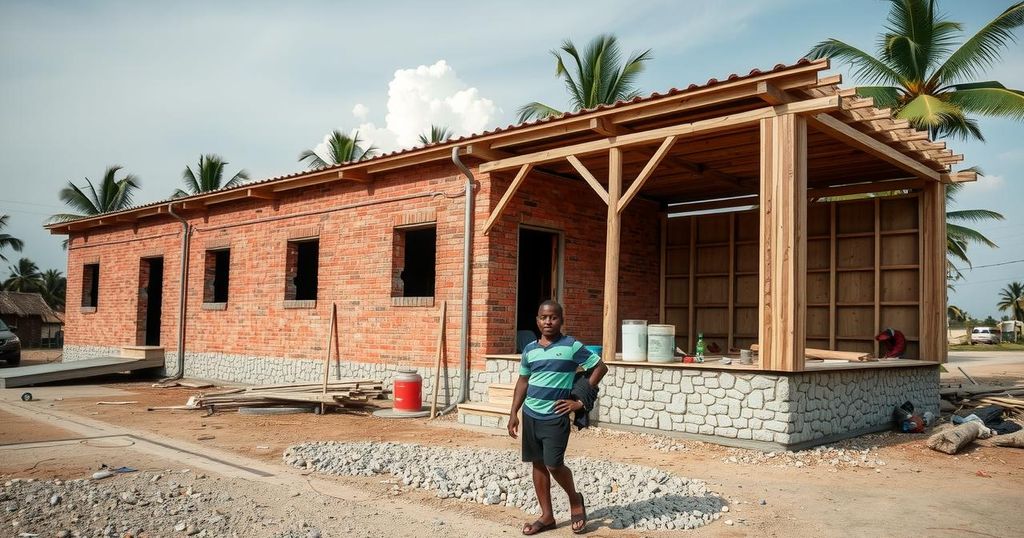Mozambique has begun building shelters for Cyclone Chido victims after the storm resulted in 70 deaths and injuries to 600 people. Government efforts, supported by international partners, focus on utilizing resilient materials for new homes. The cyclone also impacted Malawi and Mayotte, leading to widespread destruction and increased vulnerability for thousands, including those in existing public health crises.
Mozambique has initiated the construction of new homes for individuals affected by Cyclone Chido, which struck the country’s northern regions on Sunday, resulting in at least 70 fatalities and injuries to 600 residents. During a recent visit to the impacted areas, Trade and Industry Minister Silvino Moreno emphasized the government’s commitment to providing essential support, aided by international partners. The immediate focus is on building shelters using more resilient materials to mitigate damage from future storms.
Most homes in the affected areas were built using mud and reeds, which proved inadequate in withstanding the cyclone’s intensity. Minister Moreno also acknowledged the necessity for improved construction training for local communities. Prior to reaching Mozambique, Cyclone Chido had already caused severe damage in Mayotte, a French archipelago, leaving numerous communities vulnerable, especially those comprised of asylum-seekers and refugees.
In southern Malawi, the cyclone resulted in strong winds and heavy rains that destroyed infrastructure and homes across various regions. Mozambique’s meteorological agency has warned that additional storms are anticipated in the upcoming three months of the rainy season, underscoring the importance of enhanced preparedness.
According to UNICEF, an estimated 174,000 individuals have been affected by Cyclone Chido, with ongoing assessments potentially increasing this number. The cyclone’s destruction extended beyond residential structures, impacting classrooms and health facilities. Michael Chimedza, head of UNICEF’s field office in Zambezia province, stated that the organization is mobilizing support to assist 50,000 individuals immediately, along with facilitating response training at the local level.
The cyclone’s path also affected Cabo Delgado and Niassa provinces, resulting in power outages for more than 25,000 families and damaging vital infrastructure, including health units and water supplies. Given the existing cholera outbreak in the region, the recent devastation has heightened concerns regarding potential escalations in disease transmission, as noted by humanitarian agencies.
The devastation caused by Cyclone Chido highlights the vulnerability of communities in Mozambique, particularly those dependent on inadequate housing materials. The government, recognizing the urgency of the situation, is prioritizing the construction of storm-resilient shelters to protect against future disasters. Additionally, the cyclone’s impact extends beyond Mozambique, affecting neighboring regions like Malawi and earlier, Mayotte, which underscores the widespread ramifications of severe weather events in the region. The increase in expected storms during the rainy season calls for improved disaster preparedness strategies to safeguard affected populations.
In conclusion, the aftermath of Cyclone Chido has prompted significant responses from both the Mozambican government and international aid organizations to assist affected communities. The emphasis on constructing more durable homes and improving local construction practices is crucial for resilience against future cyclones. Additionally, the cyclone’s broader impact across regional borders reiterates the necessity for coordinated disaster management efforts to ensure community safety and health amid ongoing challenges like cholera outbreaks.
Original Source: www.voanews.com






